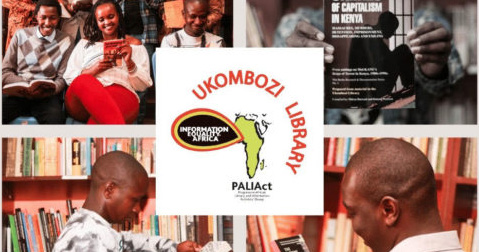Vita Books, Mau Mau Research Centre and Mwakenya founded the Ukombozi Library in August 2017 to provide progressive literature, especially on socialism. The library has received valuable items from the progressive community in Kenya and overseas including the collection of material around the December Twelve Movement in the 1980s. Its approach is to take relevant information to people where they are. The library is an activist one and connects with community groups through its Community ReachOut project. It holds weekly political study sessions where socialist books are read and discussed. The library strives to break with the colonial and imperialist mould of public libraries by focusing on the informational needs of students, working people, and peasants. National and tertiary libraries rarely meet these needs. The library was given the name Ukombozi (Liberation) to highlight the need to liberate people from capitalist and imperialist mindsets. The library loudly proclaims on its aim on its logo: ‘Information Equality, Africa’. That theme is never heard from national libraries. At the same time, it indicates that its perspective is a Pan-African. The Ukombozi Library focuses on material geared towards empowering the working class. Its focus seeks to contribute to awakening people who can then participate in the struggle for a better Kenya — a Kenya where socially created wealth benefits everyone, as opposed to the present situation in which a minority gobbles up disproportionate amounts of the nation’s wealth. The library places emphasis on books covering history, resistance, and theoretical works on socialism and Marxism. These include works by Marx, Engels, Lenin, Stalin, and Mao. Additional materials include experiences from Vietnam, China, Cuba and Albania. African topics are represented mainly by the writings of Kwame Nkrumah and Patrice Lumumba. Kenyan materials held in the library include studies on the Mau Mau as well as on earlier struggles against Kimani Waweru: The Ukombozi Library colonialism. The material published underground by DTM and Mwakenya, as well as Umoja and the Committee for the Release of Political Prisoners in Kenya (CRPPK) in London, are also available. Other materials include videos, photos, and conference proceedings from various relevant events. Again, such material is not common at most university libraries in Kenya. But the collection is only one part of Ukombozi Library’s work. The library provides materials and space for student study sessions and meetings in working class areas, where it holds forums, film screenings, and related events aimed at increasing awareness and raising consciousness of political, economic, and social issues. It works closely with social justice activists in educating, politicising, and organising communities. Presently, the library is working in partnership with the Rosa-Luxemburg-Stiftung through the project, ‘Empowering Citizens in Kenya through Socialist Knowledge and Perspectives’, where it holds a series of study and discussion sessions for college and university students as well as social justice activists from both the older and younger generations. The library works with diverse communities. For example, it has recently started the project, ‘A Library Without Walls’, in partnership with Vita Books and the Kenya Prisons Service. It seeks to create opportunities for people in prisons to participate in society and to promote their creativity, reading and life skills through developing innovative services responsive to their needs. The approach is: ‘Bodies May Be Imprisoned, Minds Never’. At one level, the library links up with community organisations and political and social activists. It works with several progressive organisations to hold political and social meetings. Yet another aspect of the library’s work is its close partnership with Vita Books and Mau Mau Research Centre, which published progressive books. Ukombozi Library is deeply rooted in the life of progressive, activist young people and their organisations, such as the team that produced the pioneering Sheng’ podcast, ‘Until Everyone is Free’.
The latest project the library is setting up in collaboration with Vita Books and the Marx Memorial Library is the Kenya Trade Union Study Initiative. It aims to increase awareness of trade unionists and activists about the history of the trade union movement and to support the struggles of the working class in Kenya. Vita Books and Ukombozi Library will publish and disseminate relevant trade union literature and develop a Trade Union Resource Centre at Ukombozi Library. Ukombozi Library activities cover those of a traditional library in terms of its book work. It also undertakes research on social, environmental and political topics relevant to people marginalised by the effects of capitalism. Its collection is different from a traditional public library. Its uniqueness is in its deep roots in community organisations, mostly linked to working people and those marginalised by the mainstream society, particularly women. Ukombozi Library focuses on the needs of those whose needs have not been met by public services, and supports their struggles for equality, justice and rights. Thus, Ukombozi Library is not neutral in the on-going class struggle. It has openly declared its commitment on the side of working people. It seeks to empower working people with a socialist world outlook, to liberate minds from the capitalist and imperialist stranglehold as the necessary requirement. Its strength lies in the strong support it receives from the communities it serves. Ukombozi Library has been described as Kenya’s first socialist library.1 It is one of very few (and perhaps only) sources of Marxist and socialist literature in Kenya. It is a unique and deeply worthwhile endeavour, contributing to the revival of socialist thinking and action in Africa following decades of repression and neoliberal political hegemony


